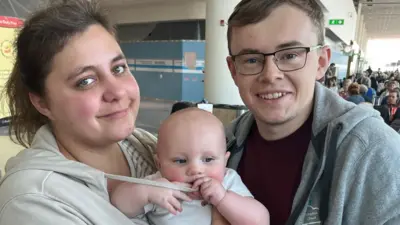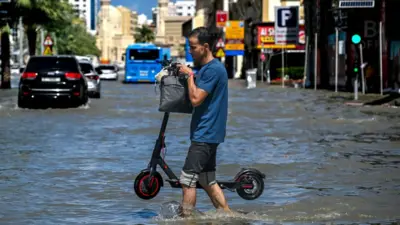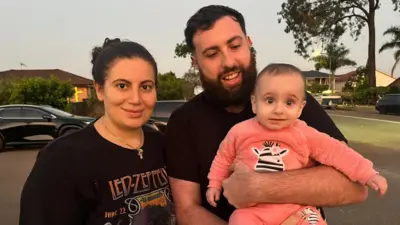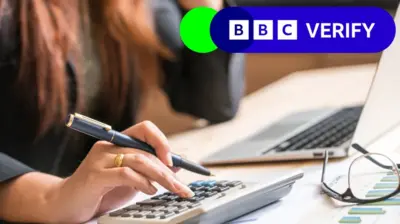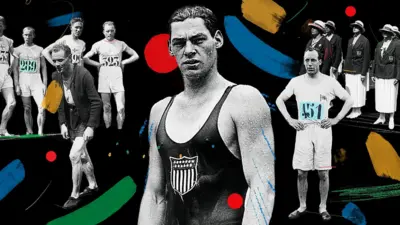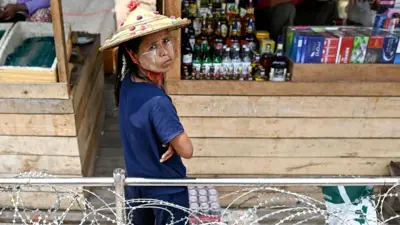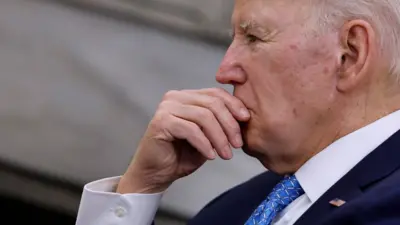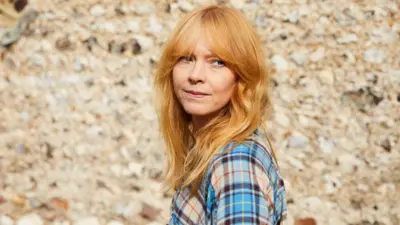We've updated our Privacy and Cookies Policy
We've made some important changes to our Privacy and Cookies Policy and we want you to know what this means for you and your data.
'I grew up in care alone - why did no-one tell me I had siblings?'
- By Ashley John-Baptiste
- BBC News
Image source, Ashley John-Baptiste
Ashley John-Baptiste grew up in care believing he was an only child. Then, out of the blue, he received a message from a brother he never knew he had. He set out to explore what being split from siblings means to those who have been in the care system.
As a toddler, I was placed in the care system. By 18, I had been moved between four foster families and a residential care home in south-east London.
It's really hard to describe what it was like growing up in so many different homes. It felt like being under a cloud of rejection - no sense of family, no sense of belonging. I did meet my birth mum when I was 10, but never met my dad. I always wondered why I wasn't adopted - was it ever a possibility?
Image source, Ashley John-Baptiste
Living in that residential home with other children gave me my first taste of brotherhood, but we had no control over our relationships in the long term. We would be moved, and disappear from each other's lives.
Children who are placed in care are given "life story" sessions by their local authority - this is where a social worker tells a child what they know about their family background and history. I was around seven when I had mine, and I was told I was an only child.
So it was a huge shock when, in my mid-20s, a man messaged me on Facebook to tell me he was my older brother. I can still remember the visceral sense of confusion I felt when I first saw his message. I had to re-read it several times.
It took me a while to respond, but when we spoke we established that we had the same dad but different mothers, that there were more siblings out there and - most overwhelming for me - that we lived in the same area. All this time, my brother had been living close by.
You can watch Ashley John-Baptiste's documentary Split Up In Care: Life Without Siblings on BBC iPlayer
Despite the intense curiosity of these initial conversations, we never made plans to meet in person. As much as I welcomed the messages from my new-found brother, I never felt ready to meet face-to-face. Eventually, four years ago, we stopped messaging each other.
But then, in the spring of 2020, as I was taking my new-born baby for a hospital check-up, I bumped into him by chance. I was leaving the hospital, he was making his way in to visit a sick relative. I recognised him instantly.
I called out to him sheepishly and to my relief, he recognised me.
We spoke for what seemed like ages. Despite it being our first meeting, there was a natural ease to our conversation. It felt like we had known each other all along.
I introduced him to my baby daughter. She met her uncle. We took a photo together in an unexpected "family" moment.
Even though we haven't met since, that moment profoundly changed my life.
Meeting my brother made me think how things could have been different if I had been given the chance to get to know my siblings when I was younger. I now know that I've got at least four, all older than me.
Every time I moved home as a looked-after child, I was forced to assimilate into a new family, to integrate in a different community and make new friends. My sense of childhood identity was fragmented between the homes I lived in. No single person knew me across all of my moves.
Image source, Ashley John-Baptiste
Meeting my brother made me imagine how things could have been if I'd had regular contact with my siblings during all the twists and turns of care. Imagine if I'd had someone like that to talk to, someone to see me grow up, it would have been a lifeline.
Even a few meetings a year while I was in care could have been a foundation for a relationship in adulthood.
I left care at 18 and lived alone in a council flat, before starting university. Living independently, where I was forced to make ends meet, brought a sense of abandonment and isolation that I wasn't prepared for.
While I had incredible friends who eased the emotional intensity of leaving care, knowing my siblings at that stage of life might have given me a sense of family and belonging. Maybe there would have been a chance to spend Christmas with family, or have somewhere to go back to between terms at university.
During our meeting outside the hospital, my brother just seemed to understand everything I was saying. He had an implicit understanding of my journey and outlook. There was a connection.
I am baffled that none of my social workers seemed to know about the existence of my siblings.
When I spoke to my old social worker, Rosalyn Payne, who looked after me between the ages of 15-18, she was surprised to hear I had a brother. So why wasn't there any information about my family in my files?
Files and information gathering have come a long way, Rosalyn told me. "Back in the day we had paper files, now we have electronic files." But that wasn't the only issue, she says. "Families don't always tell us what we want to know at the time, and that happens quite a lot, where family members withhold information."
Then I asked her a question I had never dared ask before - was I ever considered for adoption?
She told me that I was indeed put up for adoption when I was very young, but the couple who had been planning to adopt me got pregnant and withdrew from the process.
It was shattering news - realising in that moment that my life could have been completely different.
However tough such questions are, I think they're important. Everybody wants to know who they are, and who they're connected to.
For the documentary we wanted to get a national perspective on the state of sibling relationships in the care system, but there is a lack of data.
The BBC sent more than 200 Freedom of Information requests to UK councils - out of all the authorities approached, nearly three-quarters responded. Based on these responses, nearly half of sibling groups in care are split up (45%) with more than 12,000 children separated from at least one of their siblings.
And it can have a life-long impact.
I met Saskia, 24, from Manchester who was taken into care with her two brothers after being rescued from their birth family. They were adopted, but their new home was no safe haven.
Image source, Supplied
Saskia and her brothers suffered physical abuse and neglect for a decade in the adoptive home. When the adoption broke down, they went back into council care, where they were soon split up across different placements, in different areas.
Saskia was 11 at the time and contact with her brothers broke down altogether a few years later. She told me that being away from them made her feel like she was "not strong any more".
"I lost such a key part of myself," she says. "It was us three against the world, it always has been. Sometimes siblings are all you have left. If you take those away, you're taking away the last bit of someone's identity."
Saskia has now trained as a social worker, which has given her a new perspective. In hindsight, she feels they should have been allowed to stay together.
Her younger brother Toby really struggled and even spent time in prison. Although he has a job now, he told me his childhood experiences have made him into quite a resentful person. "Even if life's going good, I'll still find some way to be negative in it."
Since they left care, they have been able to rebuild their relationships. "My brothers are still in my life. I'm lucky. I see myself as very blessed," Saskia says.
According to the law across all parts of the UK, siblings should be kept together when it is possible and safe to do so. But with a rise in the number of children in care there simply aren't enough foster carers - especially now children need a room of their own. All of this means councils are struggling.
I spoke to the director of children's social care at Derby City Council, Suanne Lim, who told me that she doesn't have enough resources to fully support the children in her authority's care - even though the government did provide extra funding for vulnerable families during the pandemic.
"We are very, very stretched. There have been year-on-year cuts to services that we are delivering and yet demand is rising," she said. "Local authorities are close to the bone."
During the pandemic, Derby City council pioneered a rapid response team to support vulnerable families and prevent even more children from entering the system. Over the past 15 months the team say they have helped 60 families to stay together - and prevented 50 sibling groups from being split up.
It's clear that social workers are under huge pressure. But at the same time, so many looked-after children are separated from their brothers and sisters and don't have the information about their families that they deserve.
In Scotland, the law has recently been changed to give siblings more control over their relationships.
The Star Initiative in Fife hosts reunions for split-up sibling groups in care who get the chance to meet on the farm every few months, to hang out and rebuild their bonds.
"They've been through enough. Let's be a lifeline," says Karen Morrison, the foster carer who runs the charity. "We're not only making a difference now, fast forward to when they leave the care system."
The Children's Commissioner for England, Dame Rachel de Souza, told the BBC that she would support a new law to keep siblings together. She has today published a new report based on the views of 6,000 children in care.
An independent review of the England care system is currently underway, with findings and recommendations expected to be published later this year.
For me, I have been able to answer more of the questions I had about who I am and where I come from. Even though I didn't grow up with my siblings, I now have the chance to get to know them. But perhaps most significantly, I can tell my daughter she has an uncle.
Watch Ashley John-Baptiste's documentary Split Up In Care: Life Without Siblings, on BBC iPlayer
Top Stories
Features & Analysis
Most read
Content is not available
